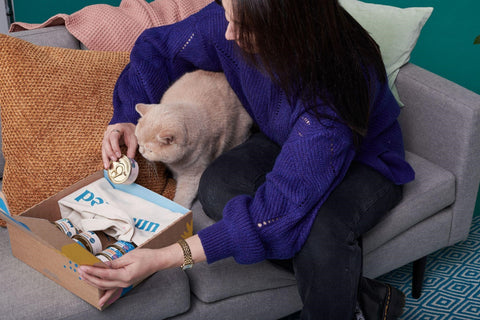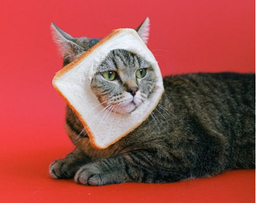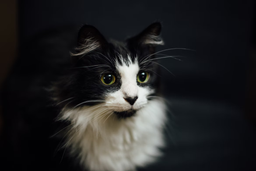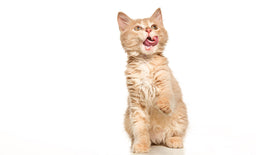Can cats eat popcorn, or would it be unsafe? Untamed tackles the issue for you!
You’re cosy in bed binge-watching something super fun, and your sweet kitty snuggles up to keep you company. The scene is idyllic until the naughty cat aims for your bowl of warm popcorn. Should you share some? Can cats eat popcorn, or is this popular snack toxic or hazardous in any way?
The answer is an ambiguous yes. Popcorn and corn aren’t toxic to felines, but they can be a health hazard if combined with wrong ingredients or served in massive portions. You should be especially cautious with readymade popcorn often loaded with harmful additives and hydrogenated oils. If you are not careful, your kitty can end up with a nasty episode of diarrhoea or vomiting.
In this comprehensive guide, you will learn about:
- Various nutritional pros and cons of popcorn
- The correct preparation technique for kitty-safe popcorn
- The types of seasoned popcorn to avoid
Why are cats attracted to popcorn?
Cats are attracted to any food that smells good to them. Since fresh popcorn is highly aromatic, kitties find them irresistible, especially buttered or cheese-flavoured products, because fatty foods are delicious to felines. Plain popcorn would taste bland, but your feline may still eat it to savour its crunchy texture.

Best time to execute a food heist? When your human’s busy watching other tiny humans livin’ in the telly.
Source: Paul Hanaoka
What type of popcorn can cats eat?
This will come as a major buzzkill, but only plain, unflavoured popcorn is 100% suitable for feline consumption. The snack should be:
- Air-popped
- Unbuttered
- Seasoned mildly or not at all
Why is buttered popcorn bad for cats?
Popcorn is low in calories but adding butter turns it into a fat and cholesterol bomb. Eating greasy food can trigger gastrointestinal issues like vomiting and diarrhoea in felines. Regular consumption of buttery popcorn will inevitably lead to weight gain, clogged arteries, and heart disease.
Eating two to ten odd kernels of buttered popcorn won’t harm your kitty, but don’t offer it as a regular snack.
What about plain salted popcorn?
Salt improves the flavour of popcorn, but it’s toxic to felines when ingested in large amounts. Salt toxicosis starts with gagging, vomiting, lethargy, loss of appetite, and tremors. In serious cases, it can kill your kitty in under 24 hours.
An average-sized cat needs about 42 milligrams of sodium in a day. Check out the approximate sodium content in popular varieties of popcorn (for a serving size of one cup):
|
Popcorn type |
Salt content (in milligrams) |
|
Air-popped |
1 mg |
|
Oil-popped |
97 mg |
|
Air-popped with butter topping |
45 mg |
|
Oil popped and buttered |
109 mg |
|
Cheese flavoured |
98 mg |
|
Low-fat microwaved |
54 mg |
|
Low-fat oil popped |
67 mg |
|
Microwaved oil popped |
88 mg |
If your kitty wants a taste of any high-sodium popcorn, it’s prudent to keep the serving size to 2–5 kernels.
Can I give store-bought popcorn to my kitty?
Almost all pre-packed popcorn is loaded with salt, butter, and other artificial flavour enhancers that are bad for your kitty. Certain readymade products may also contain:
- Diacetyl, a component of artificial butter flavouring that negatively impacts respiratory and neuromuscular health in cats
- Perfluorooctanoic acid, found in microwave popcorn, can cause hyperthyroidism in cats
Even though occasional few kernels of store-bought popcorn wouldn’t make your kitty sick, it’s better not to get them hooked on it.
Are there any health benefits to a cat eating popcorn?
One cup of air-popped popcorn contains about 30 calories and is cholesterol-free. While it is a suitable diet snack for overweight kitties, it doesn’t provide any significant health benefits. The table below outlines the nutrient profile of plain popcorn:
|
Nutrient |
Quantity (per cup) |
|
Protein |
1.03 g |
|
Fat |
0.362 g |
|
Carbohydrate |
6.2 g |
|
Fibre |
1.15 g |
|
Sugar |
0.07 g |
|
Iron |
0.254 mg |
|
Calcium |
0.56 mg |
Popcorn also has trace amounts of vitamins B, A, E, and K. Despite the nutrients, plant-based food like popcorn holds no nutritional value to cats because they are obligate carnivores who should absorb nutrients from fish, meat, poultry, and crustaceans. Some vets suggest that chewing on popcorn can help clear up tartar deposits from your feline’s teeth and improve their dental health.

Can we stop with these corny pictures, hooman? I’m carnivorous, not corn-ivorous.
Source: Shiri Gottlieb Eliaz
Cats eating popcorn—risk factors
Consider the following downsides of feeding popcorn to cats (yes, even plain popcorn!):
- Accidental choking—Popcorn presents a choking hazard due to its amorphous shape and dry texture. Certain breeds, like Persians, Scottish Folds, and British Shorthairs, are more likely to choke on the snack due to their relatively flat facial structure that influences how they consume food. If your kitty is gagging or coughing after eating popcorn, perform the Heimlich manoeuvre or rush them to the nearest animal clinic
- Fibre overdose—Cats don’t need dietary fibre. Since popcorn is rich in fibre, eating too many kernels can cause nutrient malabsorption and gastrointestinal issues in felines
- Digestive tract conditions—Unpopped kernels are hard to digest, so kitties who gorge on them may end up with various gastric problems, such as bloating, inappetence, constipation, and compromised digestion
- Tooth loss or dislocation—Unpopped popcorn kernels (similar to raw bones) can hurt your cat’s dental roots if chewed on too hard, causing chipped, dislocated, or fractured teeth
Many cats also suffer from a corn or grain allergy, which entails the following symptoms:
- Red and itchy eyes
- Inflamed skin and unnatural shedding
- Loose stools
- Unexplained weight loss
- Lack of appetite
Remember that allergies can be dangerous and cause anaphylaxis or death in extreme cases. If you want your kitty to try any new snack, it’s prudent to start with a tiny portion to avoid triggering a severe allergic reaction.
When can a cat not eat popcorn?
Cats shouldn’t eat popcorn when they are:
- Sick—Sick kitties have weak digestion and need soft and bland food during recovery. Giving them hard-to-digest popcorn kernels can overstress their tummy and make matters worse. If your cat won’t eat their usual food during a gastric episode, put them on a temporary bland diet of chicken and rice or mashed potatoes and carrots
- Pregnant—Pregnant cats go through many hormonal changes, making them prone to frequent vomiting. Popcorn can also trigger a gastrointestinal reflex, making them throw up undigested food. Queens need a high-calorie and high-protein diet containing whole meats throughout the gestation and nursing period
Vets don’t recommend giving popcorn to kittens and older cats. Weaning kittens can easily choke on popcorn, and grain-based snacks cause diarrhoea in younglings because of their underdeveloped digestive tracts. Senior cats should also abstain from this treat because it can upset their tummy due to their weakened metabolic strength

What is this treat—tiny clouds or white meat? And are you sure I should eat all of it?
Source: cat1ncat2
Keep in mind—popcorn is okay, not great
Popcorn can be an occasional snack for healthy adult cats. They may like its texture or smell but wouldn’t fancy eating too much of it. It’s a nutritionally underwhelming product because corn is not a part of your feline’s natural diet.
What about cat food containing corn?
Cornmeal or corn gluten meal is a byproduct of processed corn (cornflakes, corn oil, corn syrup, etc.). It contains concentrated proteins and carbs and is often added to different types of cat food as:
- An inexpensive meat substitute
- A starchy binder for kitty biscuits or semi-moist products
Cornmeal raises the protein content in any cat food, so manufacturers use it to make an item seem more nutritious than it actually is. Unfortunately, plant-based proteins have low bioavailability for felines. They also can’t provide essential amino acids like taurine and arginine, only available in animal proteins, such as eggs, tuna, liver, and chicken. The lack of quality protein in your cat’s diet can cause:
- Excessive hairballs due to poor coat health
- Impaired vision
- Poor muscular and joint health
- Weight imbalances
- Unhealthy eating habits and odd cravings
Carbs in corn are also problematic. Felines don’t need carbohydrates in their food. Wild cats who feast on mice and birds have less than 3% carbs in their diet. Products with corn and similar substitutes, including rice and wheat, have 30–50% carbs, which may contribute to feline obesity and diabetes if consumed often.
Vets recommend giving kitties high-protein (50% and above), grain-free wet food with whole meat and organs. Cats should eat wet food regularly for optimal health, and snacks shouldn’t exceed 10% of their daily meals.
Your cat needs a better diet? Add Untamed to the menu!
Do you feel lost in a corn maze trying to figure out the best food for your kitty? We have a solution! Untamed offers vet-formulated wet food with prime cuts of human-grade whole meat and organs. Our catalogue includes:
- Complete gravy food with 63% whole meat, offering well-balanced nutrition to cats of all breeds and ages
- Complementary jelly food with 60% whole meat, ideal as a:

My radar detects a blissful smell. Can we check out this nom-nom, hooman?
Image (c) Untamed
Why Untamed works? Because proteins are a kitty’s best friend!
Our products offer twice more protein than your average cat food. Untamed recipes are not only high in protein but also free from tummy-irritating fillers like sugar, grains, vegan proteins, and animal derivatives. There’s more—we’ll rock your kitty’s world with:
- Digestion-friendly meals—We ditch harsh processing and gently steam our food to preserve the bioavailability of essential nutrients. The meat stays tender and is suitable for kittens and seniors with sensitive digestion
- Supreme taste—Our meals retain the natural aroma and flavours, so they can please even the fussiest divas!
- Variety—If your kitty digs variety, they’ll be spoiled for choices with our tasty dishes, including chicken breast and liver, ham, duck, tuna, salmon, mackerel, sardine, and shrimp!
- Allergen-free formulas—Our vet-formulated recipes are free from all known allergens. If your cat suffers from severe food allergies, try our single-protein Chocka Chicken and Tuck-in Tuna meals
Take our TRY NOW quiz to tailor a meal plan ideal for your kitty and order a taster pack of Untamed delicacies at the best rate!
Untamed offers long-term health benefits
We have witnessed how a whole meat diet can keep kitties healthy in the long run. Our food offers multiple health benefits across different life stages:
- Kittenhood—Weaned off kittens need high-protein meals for growth and development. Eating Untamed food in suitable portions will help kittens attain their ideal weight. Avoid giving dry food to younglings as it can cause kibble addiction and lead to the rejection of healthy wet food
- Adulthood—Most indoor adult cats in the UK are neutered or spayed, so they need a limited amount of calories for sustenance. Since Untamed is sugar-free and contains less than 3% carbs, our meals are perfect for weight control and health management in adult cats, even those with diabetes
- Golden years—Senior cats are picky eaters and tend to lose weight rapidly. Our easy-to-digest food can boost their appetite and help them retain a healthy weight. Regular consumption of Untamed can also delay the onset of age-related illnesses like cystitis, arthritis, and bladder stones

Comfort for you and mouth-watering taste for your kitty—Untamed cans are storage-friendly. You won’t have to freeze or heat them!
Image (c) Untamed
Here’s what our happy clients say about the Untamed effect:
|
Timeline |
The Untamed effect |
|
One week |
|
|
Two to four months |
|
|
Six months and up |
|
Untamed is loved by all breeds. From large-sized Ragdolls and Maine Coons to super active Siamese and Bengals—our meals suit every temperament!
Ready to go Untamed? You’ll love our free home deliveries!
Shopping for quality cat food online can be time-consuming, but not with Untamed! Getting your first order is only a few clicks away:
- Take the TRY NOW quiz to tell us about your kitty’s:
- Food sensitivities
- Allergies
- Taste preferences
- Life stage
- Select products of your choice
- Place the order
You will receive the goods within a day. If our meals work for your kitty, we can send you monthly Untamed supplies at killer rates, and our shipping is always free!
We prioritise your convenience—with our cat food subscription service, you can skip, modify, cancel, or postpone an order whenever you like!
Untamed is Carbon Neutral Certified, and we use 100% recyclable packaging for our products and delivery cartons. The meat we use is ethically farmed, and seafood is sustainably fished.

Order our cute little taster pack today and see the Untamed magic unfold!
Image (c) Untamed
How to prepare kitty-friendly popcorn at home
Preparing homemade air-popped popcorn for your kitty is easy. Get some quality popcorn kernels—those with adequate moisture content inside the hardened, impermeable hulls—and pop them in an electric popper. Old kernels with damaged or broken hulls won’t pop well. Dried sweetcorn won’t work at all, as its hull doesn’t have the density necessary for popping.
If you don’t have an electric popper, you can use a stove, microwave, or air fryer. The following table offers additional details:
|
Method/equipment |
Steps |
|
Microwave |
|
|
Air fryer |
|
|
Stove |
|
You can serve about 10–20 kernels to your kitty at a time—add only a pinch of salt for palatability. Store the rest in an airtight container. Most kitties nibble on the fluffy and white starchy bits of the popcorn, leaving the hard shells untouched.

If making kitty-friendly popcorn is a hassle, don’t stress! Try other alternatives like meat treats and fish flakes. They’re healthy, and cats adore them!
Image: JAEHOON PARK
Should cats eat popcorn with different flavours and toppings?
Stored plain popcorn often loses the enticing aroma, but don’t spice it up with artificial flavouring or random toppings. If you want to amp up the taste of the popcorn, mix it with a small quantity of non-fat yoghurt. You can also add kitty-safe fruits and vegetables like apples, bananas, pumpkin, and strawberries if your furry friend likes them. Since plain popcorn is tasteless, it will absorb the flavour of these toppings, making the treat more appetising to your furry friend.
Avoid adding the following ingredients as they can be harmful to felines:
- Chocolate
- Coconut oil
- Grapes and raisins
- Peanut butter
- Caramel or honey
- Olive oil
- Avocado
- Rock salt
- Onions and garlic
- Pepper
- Cinnamon
- Raw yeast
- Dairy products (cream, cheese, condensed milk, etc.)
Healthy snacks for cats
If your cat needs low-calorie snacks, they can do better than popcorn. Here are some other healthy treats to impress hungry kitties:
- Light meat soup
- Bone broth
- Store-bought mushrooms
- Edible plants like catnip and valerian
- B.A.R.F. snacks like freeze-diet raw turkey or lean pork (make sure they are contaminant free)
Check out our other guides to what cats can or cannot eat:
|
|

![Best food for Ragdoll cats in the UK [Broken Down]](http://untamed.com/cdn/shop/articles/featured_best_food_for_ragdoll_cats_uk.jpg?v=1646818249&width=256)

